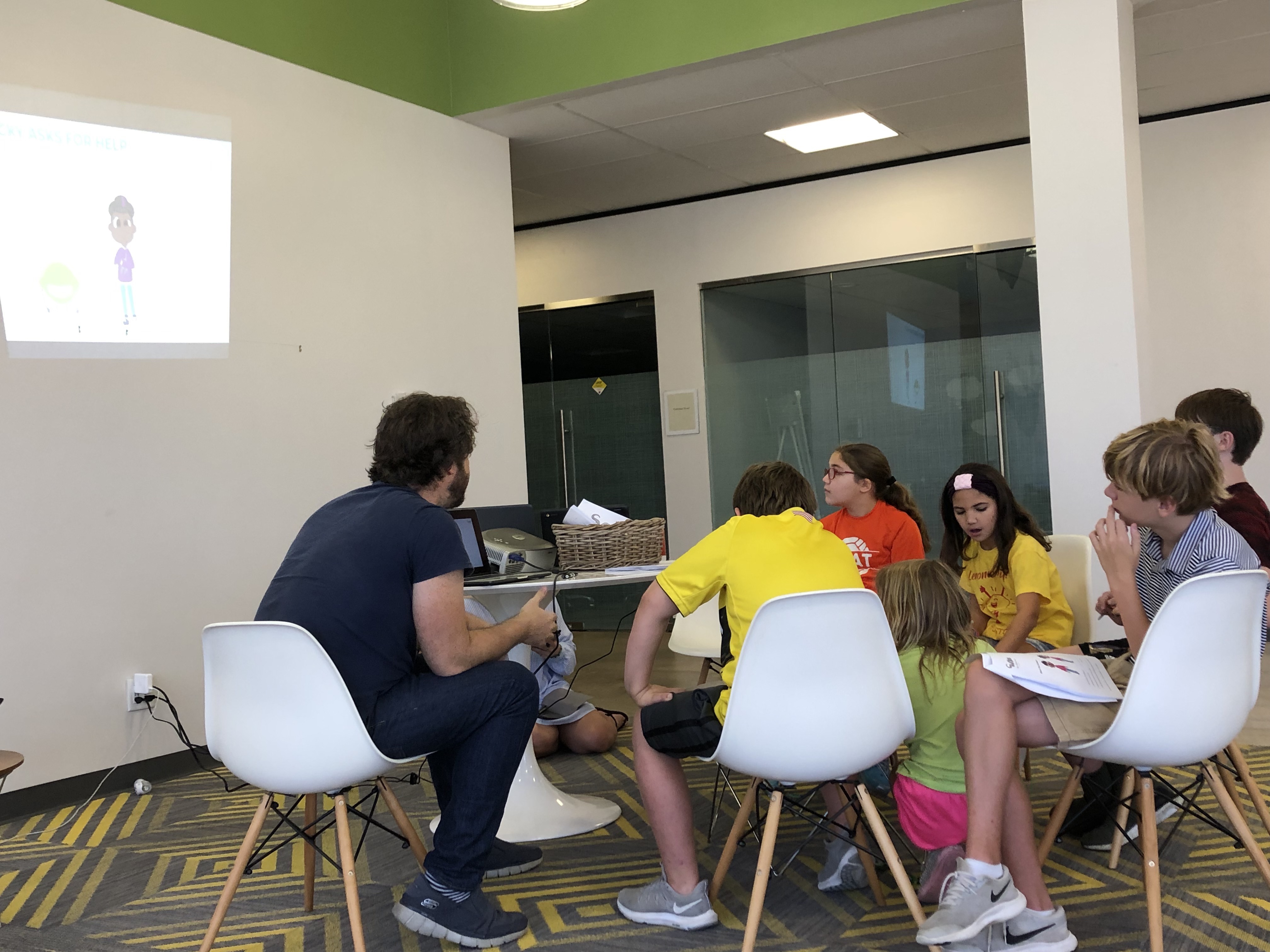Lemonade Day Leaders Support a 21st Century Youth Entrepreneurship Initiative in All K-12 Schools
BY STEVEN GORDON, LEMONADE DAY NATIONAL PRESIDENT

Global Entrepreneurship Week (GEW) – a global movement to inspire people to unleash their ideas and take the next step in their entrepreneurial journey, is next week, November 18-22. GEW was announced in 2007 by Jonathan Ortmans, president of GEW, Carl Schramm, former president and CEO of the Kaufman Foundation and Gordon Brown, former prime minister of the United Kingdom.
GEW got me thinking about entrepreneurship in schools and how Lemonade Day has already seen a positive impact on our kids in their schools and youth programs. Today, the Lemonade Day youth entrepreneurship program is being delivered in more than 200 school districts throughout the United States. Research by the venerable Gallup organization has proven that the earlier children are exposed to the positive outcomes that can accompany entrepreneurship, the more likely they are to pursue entrepreneurial opportunities in their adult life. The 2016 Gallup-HOPE index findings indicated that American kids lack the educational opportunities necessary to reinforce and unleash their entrepreneurial aspirations.
Unfortunately, many kids and teens are not learning about business planning or business risk-taking, budgeting, saving or investing either at school or at home. Fortunately, change is possible: America’s youth can and should become financially literate for their own benefit as well as society as a whole. According to the US Bureau of Labor Statistics, small businesses have created 62 percent of all net new private-sector jobs since the Great Depression.
America’s youth can assume responsibility for their own livelihood as they mature by learning how to start and operate their own small business with the support of teachers, parents, adult mentors and community volunteers. Positive change is possible by working with school systems, elected officials, faith-based organizations and non-profits to bring more entrepreneurship-based curricula to America’s classrooms.

Why should we all be interested in GEW and teaching entrepreneurship in academic environments? Entrepreneurs are the backbone of American society—they drive innovation, job creation, and national economic growth. In fact, new businesses account for nearly all net new jobs created and almost 20 percent of gross job creation. Entrepreneurship transforms communities into more attractive places to work, live, and thrive. The data supports the need for more programs like Lemonade Day:
- According to a study done by Millennial Branding and Internships.com, 72% percent of high school students want to start their own business someday and 61% expect to start a business right out of college. Corporate America is quickly becoming a second choice—what to do if all else fails. While millennials often focus on side jobs, Generation Z is starting a business in high school.
- The importance of entrepreneurship is not only found in small business, but also in poverty rates and unemployment measures. A study by the Goldwater Institute has shown that for every one percentage point increase in the rate of entrepreneurship in a state, there is a 2% decline in the poverty rate. Fostering more entrepreneurs can be extremely impactful for communities across the country. In addition, youth unemployment is increasingly becoming an international crisis. As of May 2017, youth unemployment in the U.S. was at 9.3%, costing each young person who has been unemployed for at least six months $22,000 in earnings over the next 10 years.
- According to a 2015 Gallup poll, two-thirds of adults worldwide are financially illiterate while 57% of U.S. adults overall are financially literate, with the U.S. ranking 14th in the world in financial literacy. The survey found that U.S. adults have a relatively weak understanding of compound interest. Even among those who have a credit card or who finance their homes, one-third of respondents could not correctly answer the compound interest questions.
- According to the Council of Economic Education 2018 Survey of the States, more than half of states don’t require high school students to take an economics class. Since 2016, no additional states have added personal finance to their K-12 standards or requirements. Only 17 states require high school students to take a course in personal finance, and students without a financial education are more likely to have low credit scores and other financial problems.
If you know of a school district or youth program that would be interested in opportunities that further entrepreneurship in schools, I would love to talk about how Lemonade Day can provide an impact on the lives of their children.

Please share this blog with your friends, family members, and co-workers. All of us at Lemonade Day National Headquarters appreciate your support!
I welcome your comments and suggestions at any time. Please email me at Steven@LemonadeDay.org.
For more information about Lemonade Day, please visit lemonadeday.org.

back to blog
BY STEVEN GORDON, LEMONADE DAY NATIONAL PRESIDENT

Global Entrepreneurship Week (GEW) – a global movement to inspire people to unleash their ideas and take the next step in their entrepreneurial journey, is next week, November 18-22. GEW was announced in 2007 by Jonathan Ortmans, president of GEW, Carl Schramm, former president and CEO of the Kaufman Foundation and Gordon Brown, former prime minister of the United Kingdom.
GEW got me thinking about entrepreneurship in schools and how Lemonade Day has already seen a positive impact on our kids in their schools and youth programs. Today, the Lemonade Day youth entrepreneurship program is being delivered in more than 200 school districts throughout the United States. Research by the venerable Gallup organization has proven that the earlier children are exposed to the positive outcomes that can accompany entrepreneurship, the more likely they are to pursue entrepreneurial opportunities in their adult life. The 2016 Gallup-HOPE index findings indicated that American kids lack the educational opportunities necessary to reinforce and unleash their entrepreneurial aspirations.
Unfortunately, many kids and teens are not learning about business planning or business risk-taking, budgeting, saving or investing either at school or at home. Fortunately, change is possible: America’s youth can and should become financially literate for their own benefit as well as society as a whole. According to the US Bureau of Labor Statistics, small businesses have created 62 percent of all net new private-sector jobs since the Great Depression.
America’s youth can assume responsibility for their own livelihood as they mature by learning how to start and operate their own small business with the support of teachers, parents, adult mentors and community volunteers. Positive change is possible by working with school systems, elected officials, faith-based organizations and non-profits to bring more entrepreneurship-based curricula to America’s classrooms.

Why should we all be interested in GEW and teaching entrepreneurship in academic environments? Entrepreneurs are the backbone of American society—they drive innovation, job creation, and national economic growth. In fact, new businesses account for nearly all net new jobs created and almost 20 percent of gross job creation. Entrepreneurship transforms communities into more attractive places to work, live, and thrive. The data supports the need for more programs like Lemonade Day:
- According to a study done by Millennial Branding and Internships.com, 72% percent of high school students want to start their own business someday and 61% expect to start a business right out of college. Corporate America is quickly becoming a second choice—what to do if all else fails. While millennials often focus on side jobs, Generation Z is starting a business in high school.
- The importance of entrepreneurship is not only found in small business, but also in poverty rates and unemployment measures. A study by the Goldwater Institute has shown that for every one percentage point increase in the rate of entrepreneurship in a state, there is a 2% decline in the poverty rate. Fostering more entrepreneurs can be extremely impactful for communities across the country. In addition, youth unemployment is increasingly becoming an international crisis. As of May 2017, youth unemployment in the U.S. was at 9.3%, costing each young person who has been unemployed for at least six months $22,000 in earnings over the next 10 years.
- According to a 2015 Gallup poll, two-thirds of adults worldwide are financially illiterate while 57% of U.S. adults overall are financially literate, with the U.S. ranking 14th in the world in financial literacy. The survey found that U.S. adults have a relatively weak understanding of compound interest. Even among those who have a credit card or who finance their homes, one-third of respondents could not correctly answer the compound interest questions.
- According to the Council of Economic Education 2018 Survey of the States, more than half of states don’t require high school students to take an economics class. Since 2016, no additional states have added personal finance to their K-12 standards or requirements. Only 17 states require high school students to take a course in personal finance, and students without a financial education are more likely to have low credit scores and other financial problems.
If you know of a school district or youth program that would be interested in opportunities that further entrepreneurship in schools, I would love to talk about how Lemonade Day can provide an impact on the lives of their children.

Please share this blog with your friends, family members, and co-workers. All of us at Lemonade Day National Headquarters appreciate your support!
I welcome your comments and suggestions at any time. Please email me at Steven@LemonadeDay.org.
For more information about Lemonade Day, please visit lemonadeday.org.
@LemonadeDayNational








